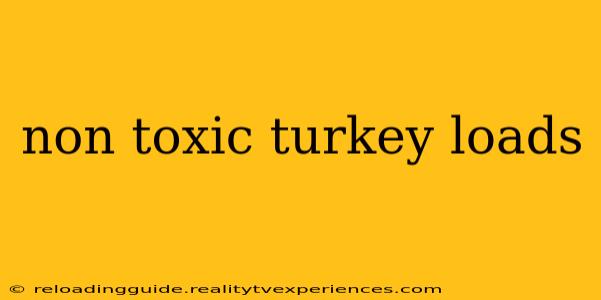Hunting turkeys requires precision and ethical considerations. While lead shot remains a popular choice, its toxicity poses significant risks to wildlife and the environment. Fortunately, numerous non-toxic alternatives offer comparable performance and promote responsible hunting practices. This guide explores various non-toxic turkey loads, their effectiveness, and considerations for choosing the right option for your hunting needs.
Understanding the Need for Non-Toxic Ammunition
Lead shot's toxicity is well-documented. Ingestion by waterfowl and other birds can cause lead poisoning, leading to decreased reproductive success, impaired neurological function, and mortality. Furthermore, lead contamination affects the entire ecosystem, impacting soil and water quality. Many states and countries have already implemented restrictions or outright bans on lead ammunition, emphasizing the growing need for non-toxic alternatives.
Types of Non-Toxic Turkey Loads
Several effective non-toxic options exist, each with its own advantages and disadvantages:
1. Steel Shot:
- Pros: Widely available, relatively affordable, and offers good performance at closer ranges.
- Cons: Can be harder on barrels, potentially leading to increased wear and tear. Pattern consistency can be less predictable compared to lead, requiring more careful pattern testing. Penetration may be reduced compared to lead at longer ranges.
2. Bismuth Shot:
- Pros: Offers superior density compared to steel, resulting in better penetration and pattern consistency at longer ranges. Less barrel wear than steel.
- Cons: Significantly more expensive than steel shot.
3. Tungsten-Iron Shot:
- Pros: The densest non-toxic option, providing exceptional penetration and range. Excellent pattern density for effective kills.
- Cons: The most expensive option available. Can be very hard on barrels.
4. Tungsten-Polymer Shot:
- Pros: Combines the density benefits of tungsten with the softer impact of polymer, reducing barrel wear while maintaining impressive penetration.
- Cons: Generally more expensive than steel but potentially less costly than pure tungsten-iron.
Choosing the Right Non-Toxic Load: Factors to Consider
Selecting the best non-toxic load depends on several factors:
1. Hunting Conditions:
- Range: Longer ranges necessitate denser shot like bismuth or tungsten to ensure effective kills.
- Terrain: Dense brush may require a tighter shot pattern, influencing the choke choice and shot size.
- State Regulations: Check your state's regulations for permitted non-toxic ammunition.
2. Shotgun and Choke:
- Barrel Material: Some non-toxic shots are harder on barrels than others. Consider the material and its tolerance for different shot types.
- Choke Tube: Experiment with different chokes to optimize pattern density for your chosen non-toxic load. A proper pattern test is crucial before hunting.
3. Shot Size:
- Turkey Size and Distance: Larger shot sizes (e.g., #4, #5, #6) are typically preferred for turkeys, but the ideal size will depend on the range and the chosen ammunition type.
Pattern Testing: A Crucial Step
Before hunting, thoroughly test your chosen non-toxic load and choke combination at the ranges you anticipate hunting. This ensures you understand the pattern consistency and effectiveness of your ammunition, contributing to ethical and successful hunting.
Conclusion: Embracing Ethical Hunting Practices
Switching to non-toxic turkey loads is a responsible choice that protects wildlife and the environment. While the upfront cost might be higher, the long-term benefits to conservation and responsible hunting far outweigh the initial investment. By carefully considering the factors outlined above and performing thorough pattern testing, you can choose the right non-toxic load for a successful and ethical hunting season.

